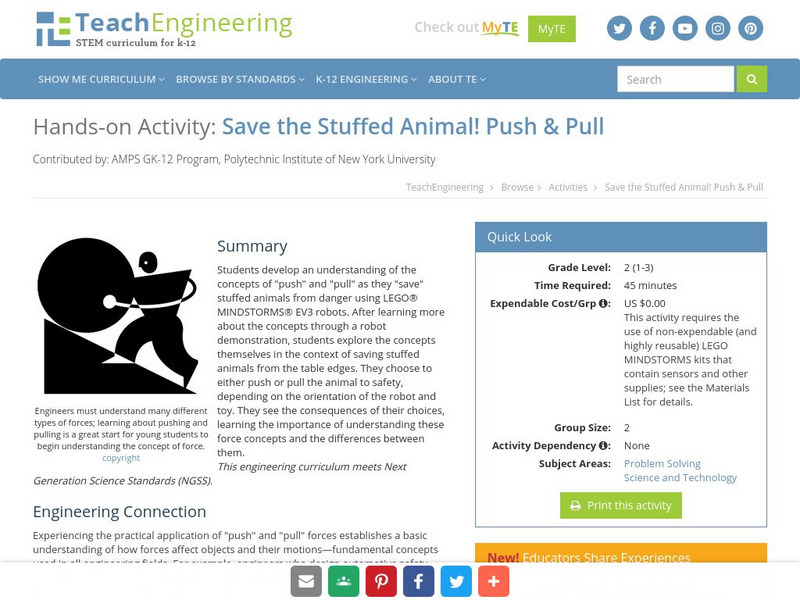Hi, what do you want to do?
TED Talks
Ted: Ted Ed: Make Robots Smarter
There are three major rules that we want our robots to follow: do not harm a human, obey us, and protect us. The prerequisite for these rules? We need to make robots smarter. Ayanna Howard explains how robots can become smarter (hint: it...
TeachEngineering
Teach Engineering: Humans Are Like Robots
Four lessons related to robots and people present students with life sciences concepts related to the human body (including brain, nervous systems and muscles), introduced through engineering devices and subjects (including computers,...
TeachEngineering
Teach Engineering: How Do You Make Loops and Switches?
Learners learn how to program using loops and switches. Using the LEGO MINDSTORMS NXT robots, sensors and software, student pairs perform three mini programming activities using loops and switches individually, and then combined.
Curated OER
Cbc Kids: 10 of the Latest Inventions to Make Life a Little Easier
Learn about some of the nifty inventions that add more functionality to common objects. With the Smart toothbrush, your teeth will be clean in no time. The Albert Clock forces you to answer a Math question before it tells you the time....
Read Works
Read Works: How to Make a Better Robot
[Free Registration/Login Required] An informational text about improvements in robotics. A question sheet is available to help students build skills in reading comprehension.
ABCya
Ab Cya: Make a Robot
Kids will enjoy engaging in this interactive to build a virtual robot. Extend the activity by printing out the creation and incorporating language arts as students write a descriptive story about their new robotic friend or an expository...
TeachEngineering
Teach Engineering: Biomimicry: Echolocation in Robotics
Students use ultrasonic sensors and LEGO MINDSTORMS NXT robots to emulate how bats use echolocation to detect obstacles. They measure the robot's reaction times as it senses objects at two distances and with different sensor threshold...
TeachEngineering
Teach Engineering: Putting Robots to Work With Force & Friction
Students learn about the concept of pushing, as well as the relationship between force and mass. Students practice measurement skills using pan scales and rulers to make predictions about mass and distance. A LEGO MINDSTORMS NXT robot is...
TeachEngineering
Teach Engineering: Movement Task Using Sensors Humans and Robots
This activity helps students understand the significance of programming and also how the LEGO MINDSTORMS NXT robot's sensors assist its movement and make programming easier. Students compare human senses to robot sensors, describing...
TeachEngineering
Teach Engineering: How Do You Make a Program Wait?
Building on the programming basics learned so far in a corresponding Robotics unit, young scholars learn how to program using sensors rather than by specifying exact durations. Working with the LEGO MINDSTORMS NXT robots and software,...
TeachEngineering
Teach Engineering: Understanding Movement in Humans and Robots
This activity helps students understand how a LEGO MINDSTORMS NXT robot moves using motors and wheels. Then students relate the concepts of decision-making actuation and motion in humans to their parallels in mechanized robots, and...
TeachEngineering
Teach Engineering: Human and Robot Sensors
Students are provided with a rigorous background in human "sensors" (including information on the main five senses, sensor anatomies, and nervous system process) and their engineering equivalents, setting the stage for three associated...
TeachEngineering
Teach Engineering: Are We Like Robots?
Learners explore the similarities between how humans move and walk and how robots move, so they come to see the human body as a system from an engineering point-of-view. Movement results from decision making (deciding to walk and move)...
Technovation
Curiosity Machine: Challenges: Build a Robotic Face
Build a robotic face that can make facial expressions using simple machines on this website. This website includes the challenge, tips, a lesson plan, and a place for students to document their engineering design process.
Other
Allerin: How Green Robots Are Helping With Environmental Sustainability
Robots are now being used to fight climate change and protect our green environments. They help to fight forest fires, manage our waste, restore the oceans, support renewable energy initiatives, and make agriculture more-environmentally...
Better Lesson
Better Lesson: Creating a Robot (2 Days)
What do tin foil, surface area, and rectangular prisms make? A tin foil robot of course! This lesson includes practice problems about surface area, worksheets, a video explanation, and a reflection sheet.
TED Talks
Ted: Ted Ed: Making a Car for Blind Drivers
Using robotics, laser rangefinders, GPS and smart feedback tools, Dennis Hong is building a car for drivers who are blind. It's not a "self-driving" car, he's careful to note, but a car in which a non-sighted driver can determine speed,...
NOAA
Noaa: Build an Underwater Robot [Pdf]
Construct an underwater robot to explore below the surface. Change to the robot to make it work to meet your expectations.
English for Everyone
Reading Comprehension Assessent: "Robots" [Pdf]
Read Theory provides a free reading comprehension assessment that is designed for reading students in elementary grades. Six multiple choice questions and one extended response question are included on the nonfiction reading assessment.
TeachEngineering
Teach Engineering: Hare and Snail Challenges
Students extend the ideas learned in the maze challenge in this unit with a focus more on the robot design. They learn how to design the gear train from the LEGO MINDSTORMS NXT servomotor to the wheel to make the LEGO taskbot go faster...
Other
Science Museum of Minnesota: Making a Jitterbug [Pdf]
You can make a simple robot using a few simple materials. The directions come from an exhibit on robots at the Science Museum of Minnesota.
PBS
Pbs Teachers:you Can Make It on Your Own: Robo Wars
Enter a robot design competition. Assemble a motor-powered vehicle that can climb up the steepest ramp angle, using a specified selection of parts, and make improvements in the design as needed.
TeachEngineering
Teach Engineering: Robo Clock
Students learn various topics associated with the circle through studying a clock. Topics include reading analog time, understanding the concept of rotation (clockwise vs. counter-clockwise), and identifying right angles and straight...
TeachEngineering
Teach Engineering: Save the Stuffed Animal! Push & Pull
Students develop an understanding of the concepts of "push" and "pull" as they "save" stuffed animals from danger using LEGO MINDSTORMS NXT robots. After learning more about the concepts through a robot demonstration, students explore...






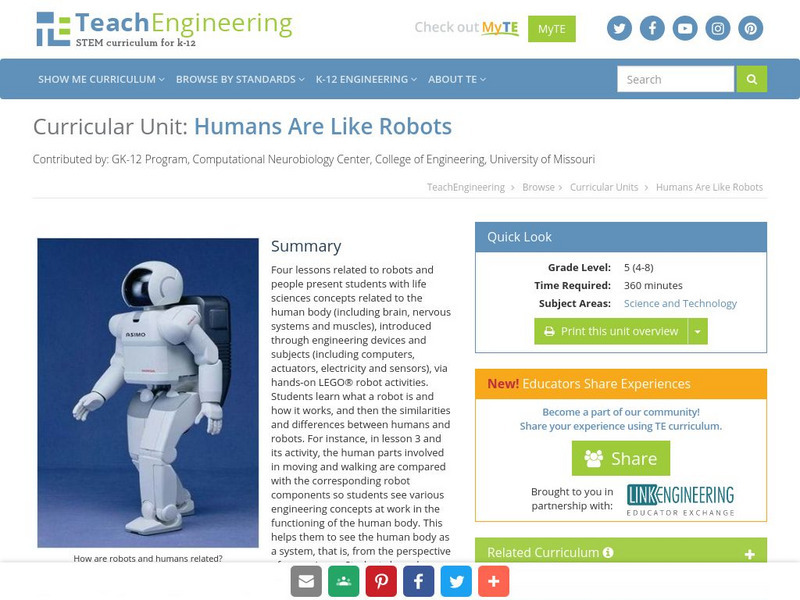





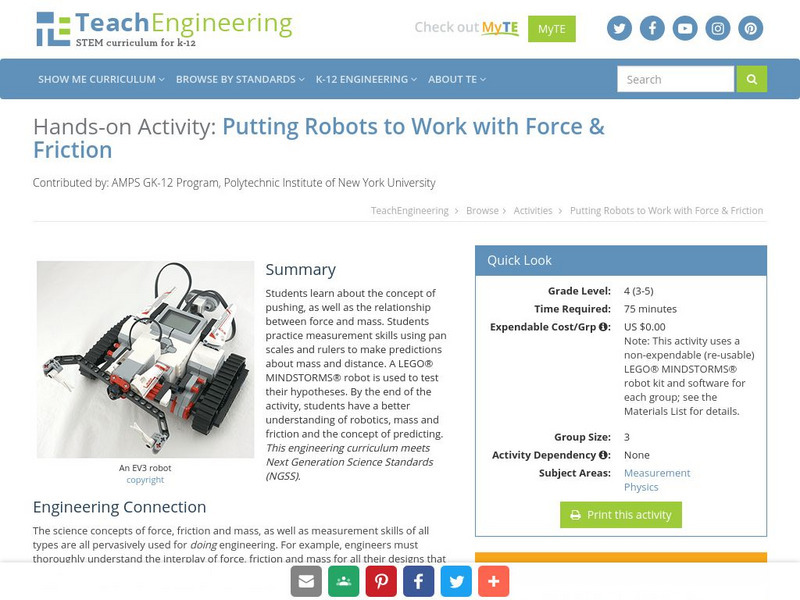
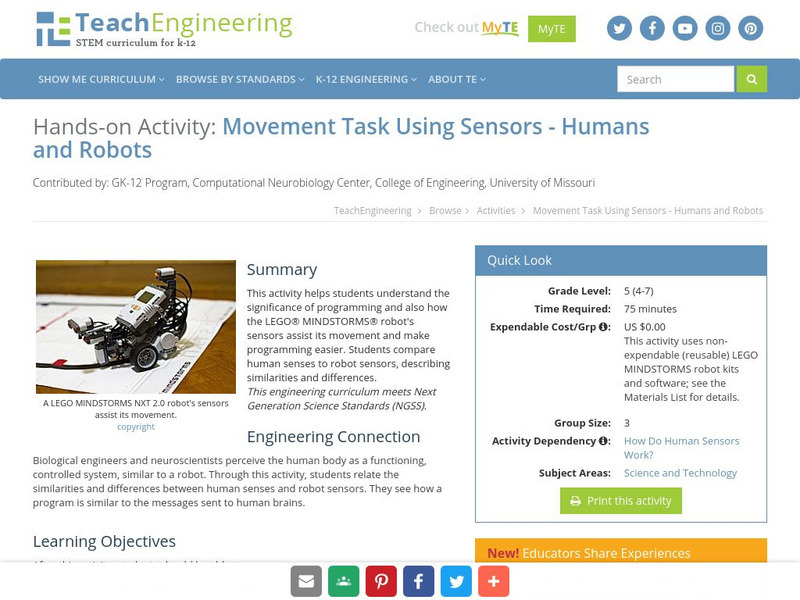
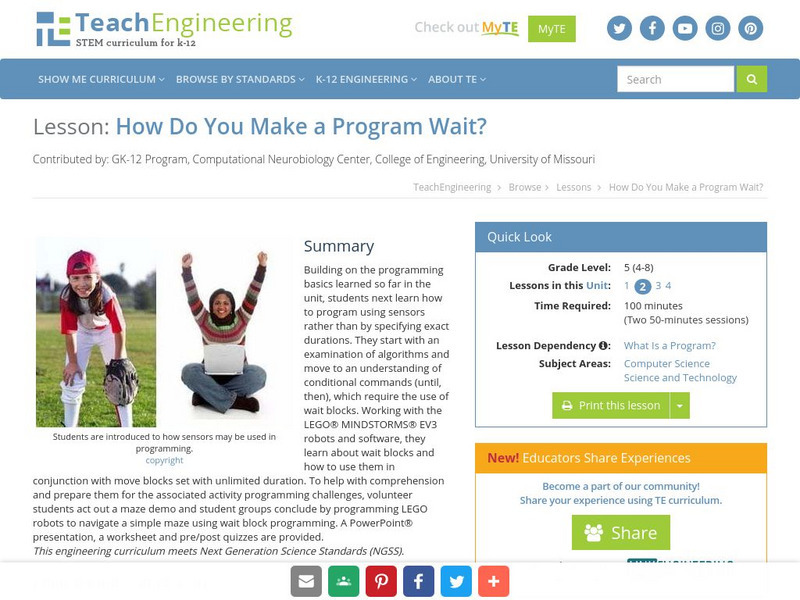





![Noaa: Build an Underwater Robot [Pdf] Activity Noaa: Build an Underwater Robot [Pdf] Activity](http://lessonplanet.com/content/resources/thumbnails/457131/large/bwluav9tywdpy2symdi0mdkwoc0xnjcwndu4lxfrcwq4cc5qcgc.jpg?1725776715)
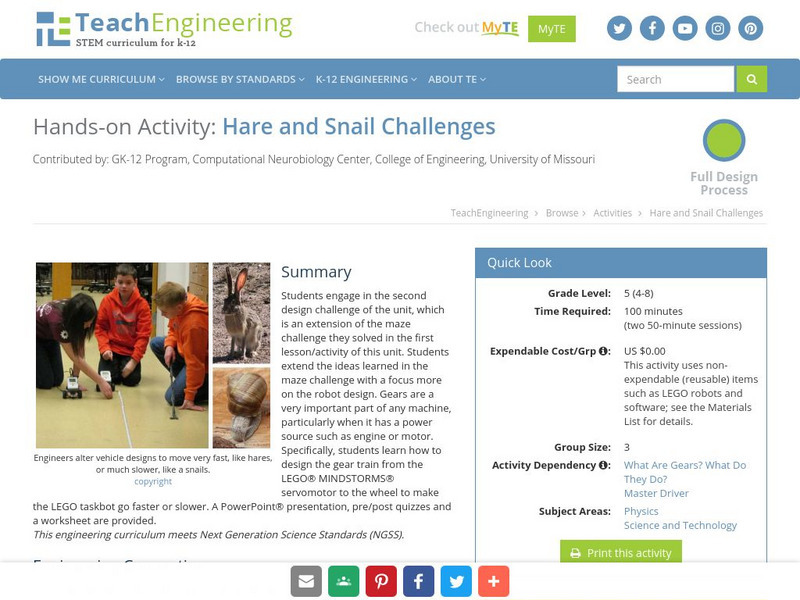
![Science Museum of Minnesota: Making a Jitterbug [Pdf] Activity Science Museum of Minnesota: Making a Jitterbug [Pdf] Activity](http://lessonplanet.com/content/resources/thumbnails/410020/large/bwluav9tywdpy2symdiwmduymc0yndiyoc0xawvjbnhrlmpwzw.jpg?1589984819)


